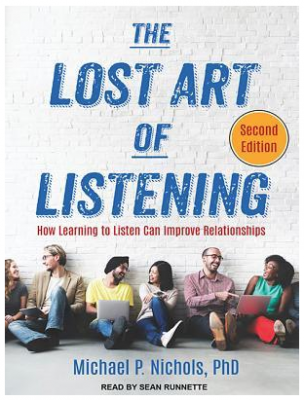The Lost Art of Listening – Michael P. Nichols, PhD

Just because something is simple, doesn’t mean it’s easy. Actively listening is much harder than we believe it is and this book covers the subject from so many aspects. The author is a family therapist and his wisdom comes from years of helping individuals, families and couples to figure out better ways of communicating – which starts with cultivating better listening skills.
How we communicate – and listen – goes back to how we learned to do that in our families. Our parents may be the most important unfinished business of our lives.
We relate to people in the present on the basis of expectations from the past. We continue to live in the shadows of the families we grew up in. The sometimes vast difference between words spoken and message intended is nothing compared to the often vaster difference between what is said and what it heard.
Nichols makes an excellent point about self acceptance as the foundation of being an empathetic listener.
When you are trying to figure out why you or anyone else overreacts, keep in mind one of the great ironies of understanding: We are likely to be as accepting of others as we are of ourselves. That’s why those lucky enough to be raised with self respect make better listeners. If you learn to respect other people’s feelings, you will learn to treat your own feelings more kindly in the process. What we can’t tolerate in others is what we can’t tolerate in ourselves.
In addressing the hurdles encountered by couples, he has some very profound observations to make:
A relationship isn’t some you have, it’s something you do.
Sometimes marriage isn’t about resolving differences, but learning to live together with them.
Second and third marriages don’t fail because people keep picking the wrong partners. They fail because it’s not differences that matter, but how they are negotiated.
If you want the truth from someone, you must make it safe for him or her to tell it.
While he addresses listening in the work place in very effective ways, I found the most interesting parts of the book to be about the challenges of listening to the people who matter the most to us – our family members.
Ironically, our ability to listen is often worst with the people closest to us. Conflict, habit and the pressure of emotions makes us listen least well where listening is most needed. As we move outside the family circle to those we care about but don’t live with, we tend to be more open, more receptive and more flexible. Primarily because those relationships are less burdened with conflict and resentment.
In struggling to figure out just how much bandwidth I have to truly listen to the people I engage with everyday, I’ve come to the conclusion that not every person I encounter needs my full and undivided attention. In fact, there are people who demand attention in ways that mean it’s being taken away from others in my life who are important to me. Social media demands attention in ways that are often overwhelming and many times unproductive. Emails come flowing into several email accounts at all hours, seven days a week, with an immediate response expected. So intentionality is required to make certain that the people who should have our undivided attention are the ones actually getting it.
Sometimes it makes sense to write off unrewarding relationships that aren’t central to your life. That is a hard thing to do. Ultimately, saying “no” to that which is unrewarding means leaving more room for that which is rewarding.
I found this book an excellent read. If for no other reason, it reminded me of things I know to be true, but don’t always practice. Honing the skill of being an active listener is an endeavor worth undertaking.